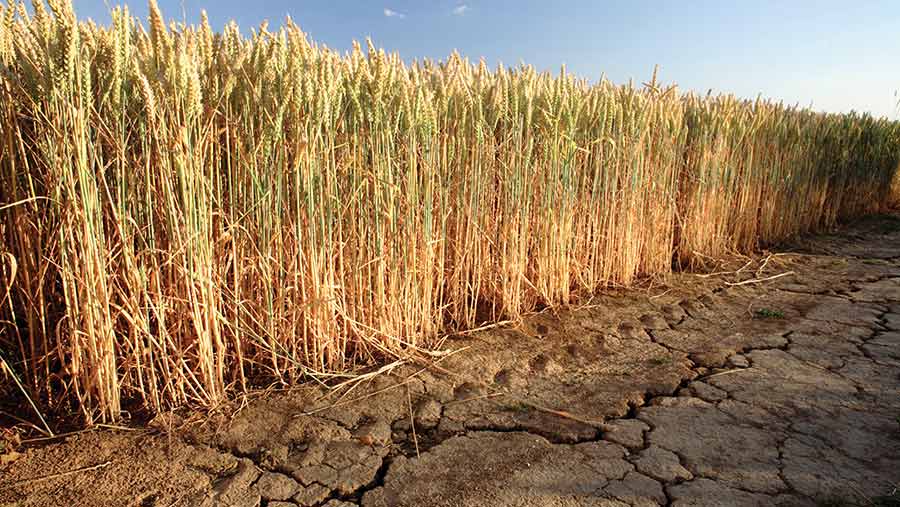Hot weather hits yields in EU and grain deal suspended
 © Vom/Adobe Stock
© Vom/Adobe Stock Extreme temperatures in Europe, a suspension to the Black Sea grain deal and cuts to global production estimates have all offered short-term support to wheat markets.
Hot and dry conditions on the Continent have been damaging crop yields, but total EU cereals production is still expected to be high.
The EU Commission forecast cereals production in 2023-24 at 278m tonnes, and European farming group Copa Cogeca has forecast it at 256m tonnes, due to a more severe effect on yield prospects than expected.
See also: Winter barley averages £119/acre at standing crop auction
However, yields in the EU should still be higher than last year with the exception of barley, according to the commission’s latest short-term outlook.
“Despite the expected drop in EU cereal area in 2023/24 (-1%) and reduced yield growth due to weather developments in spring, EU cereal production is due to be 5% higher,” said the commission.
Drought conditions
The EU Joint Research Centre said variable drought conditions kept affecting large parts of Europe, with more rain forecast in the Mediterranean, but less in central and northern Europe, particularly in the regions around the Baltic Sea.
Paris milling wheat futures increased by €2.25/t (£1.95/t) on the week for the September contract to stand at €234.5/t (£203.5/t) on 18 July.
In the UK, harvest has been very fragmented so far with heavy showers limiting progress.
UK feed wheat futures opened at £203/t on 19 July for the November contract, up £11.50/t on week-earlier levels.
Spot prices collected by Farmers Weekly on 19 July averaged £180/t for feed wheat and £148/t for feed barley on 19 July.
Russia pulls out of Black Sea grain deal
Markets have been reacting to the news of Russia halting the Black Sea grain deal on 17 July.
In total, 32.9m tonnes of agricultural commodities have been exported via the grain corridor since its inception, including 17m tonnes of maize and 9m tonnes of wheat.
A Kremlin spokesman said part of the agreement concerning Russia has not been implemented so far, so its effect is terminated, according to Reuters news agency.
Grain has also been exported out of Ukraine using road and rail links, but this has put increased pressure on grain markets in eastern Europe.
Farmers Weekly spoke to Andrey Sizov, head of market analysis firm SovEcon, which focuses on the Black Sea region.
He said the suspension of the deal wasn’t fully expected by markets and the consensus was that the deal would be extended, like in the past.
“We have seen a smaller reaction from Matif [Paris futures], they might be afraid that more grain from Ukraine could flow into the EU.”
Infrastructure attacks
Attacks on Ukrainian infrastructure are now more likely, according to Mr Sizov.
“Ukraine can fulfil its export programme even without the Odesa terminals because it has the Danube terminal, which is becoming more important and is likely to be the main export route,” he added.
Carlos Mera, Rabobank’s head of agricommodities markets, said Ukraine would now be forced to export most of its grains and oilseeds through its land borders and Danube ports.
“This will significantly drive up transportation costs and pile further pressure on Ukrainian farmers’ profits,” he said.
“The knock-on effect of this could be to prompt them to plant less next season, placing further pressure on supplies going forward.”
